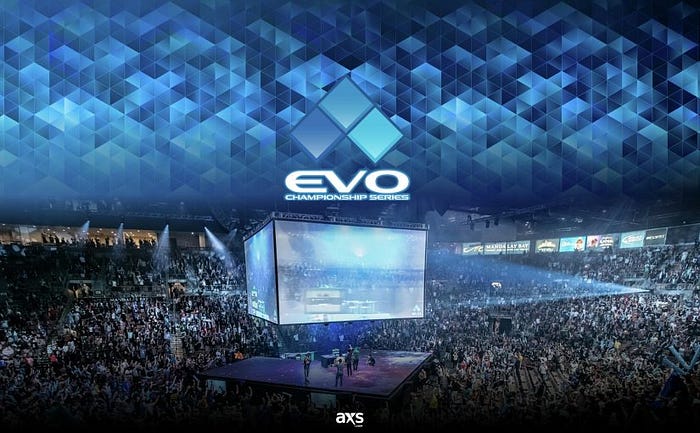Evo 2020 and what it means for the FGC
The ramifications of cancelling the world’s biggest fighting game event

It was inevitable, but it was still a shock. It was like the last big domino at the very end of some elaborate, disastrous Rube Goldberg machine, and we knew that the machine was constructed in such a way that the domino would have to fall over with an uncomfortable thud. Still, there were some of us who held out hope. Maybe it’ll be better later on, safer. We watched as the marbles rolled along the slides and pulleys and counterweights, wondering if the eventuality at the end was even guaranteed.
And yet, like Michigan Masters, Final Round, Combo Breaker, and so many other local and regional events, it finally happened. On May 1st, 2020, Evo publicly announced on its Twitter page that Evo 2020 at Mandalay Bay in Las Vegas would be cancelled, and all tickets would be refunded. This news comes a week after Las Vegas mayor Carolyn Goodman called for businesses in Sin City to be reopened without any social distancing legislation in place. Meanwhile, beaches along the West Coast have been host to protests against safety measures prohibiting large gatherings in the midst of early reports that California has successfully begun flattening the curve.
It’s not safe to go outside to play fighting games right now. That’s the short of it. Evo being cancelled is ultimately for the safety of the FGC, as well as the safety of Nevadans and even the world. Imagine: international players, from countries where reported infected cases have fallen tremendously, travel to the US, where the rate of infection remains high due to systemic issues with public healthcare, and then unknowingly bring the virus back home with them. I sort of neglected writing about event closures and COVID-19 lately because I felt it wouldn’t be productive to drolly report on whichever group of TOs got hit this time from week to week. But this is Evo we’re talking about- regardless of how you feel about the event or the people behind it, it’s the largest of its kind. While the closure of events will keep us protected in the long run, it could also have a devastating impact on the community at large, and Evo’s closure dramatically punctuates that impact.
In general, any event on this scale that cancels can afford to do so due to the force majeure/act-of-God clauses in their contracts that protects them from liability when a pandemic or other disaster like this prevents them from carrying on the event like normal. This means that an event like Evo or Combo Breaker can afford to call off their event without the event runners going completely bankrupt- if the city forces the venue to close and cease hosting all events into the foreseeable future, the event itself won’t owe the venue anything. This isn’t always the case, however; MiM@s was one event that was tragically forced to cancel in light of early COVID-19 panic and severe amounts of entry refunds, which led the tournament organizers to eat the costs. The result of such a scenario is that MiM@s will likely never come back. Even though the MiM@s crew is reportedly done paying off their debts due to the grace of community donations, the event itself is likely too risky for them to put on again in the future. (As far as I am aware, you can still support MiM@s as well as other events listed above by purchasing items from their merch store where available.)
Also, just because some events end up being in the clear to cancel safely doesn’t suddenly make everything okay. Beyond the events like MiM@s that are potentially rendered defunct forever, there are also local events that simply don’t operate anymore. Many of these events like Wednesday Night Fights and Next Level Battle Circuit have made the jump to netplay tournaments, but that still deprives these organizations and their venues of regular weekly fees. There’s also people at all levels who are out of work when events like these are cancelled. Event staff like stream production- which itself can include people who work on video and audio editing, operating the stream itself, lighting and photography-, commentators, bracket organizers, contract workers like myself that write articles and create video content for outside organizations, artists who booth at events, and even more people are now unable to find work in-person. There is certainly an effort to supplement that work online- for myself, I’ve been writing on Medium and streaming on Twitch five days a week- but the contract work from events throughout the year accounts for a majority of income for anyone who works primarily in the FGC.
In the same statement where Evo announced the cancellation of their main event, they also announced that the event would be moving to an online space. Online tournaments run into their own issues, as anyone who has been attending them for the past two months can attest. The elephant in the room here is usually the netcode. Even when events limit who can enter to “x-region only, must own a LAN adapter/be on wired connection, must take a network test and present results,” network issues can still occur. Since a vast majority of titles being played at events both on- and offline are games that use delay-based netcode solutions, these network issues are both frequent and frustrating. Prior to online-only brackets, delay-based netcode mostly meant that online practice would never be as valuable as attending your locals due to shoddy matchmaking and lag spikes. Now, however, players are forced to compete in that same environment. This means that you can drop a combo- or a whole set- because your opponent may insist that their wireless connection is perfectly fine, or due to an infrastructural network issue out of your control.
Of the nine titles currently on the roster at Evo 2020, only two of them (Street Fighter V Champion Edition and Marvel vs. Capcom 2) support rollback-based netcode, and even then, the official Marvel 2 port with GGPO has been delisted from digital download services since 2013. While we have been promised news in the future, an online event on the scale of Evo where tens of thousands of players are trying to compete against each other doesn’t seem feasible to people who are aware of the deficiencies present in the titles as they exist now.
Online tournaments still have their value, of course, and that value is more pronounced now than it ever has been. The FGC at its core is about promoting a space where people can feel welcomed by new players, where they can get the opportunity to learn, improve, and compete against their closest friends in the games that they love most. That core value will never go away, whether the space moves from the physical to the online. Continuing to provide that environment by hosting online events and streaming talent, perhaps even new talent that couldn’t access the offline tournament, will allow the FGC to continue to grow during these trying times. I’ve been watching and attending online WNFs, and while the nature of the events can never completely emulate that feeling of stepping into the venue where hundreds of people are yelling and clacking away at setups, it’s still an incredible experience on its own.
Still, the impact that COVID-19 has had on the community cannot be understated. Being forced to play online only has exposed to developers just how important it is that their main, basic services be functional for the benefit of the player base. (It could even be argued that COVID-19 was an influence on ArcSys moving forward with rollback netcode for the upcoming Guilty Gear title.) Event cancellations have left many people struggling to find work or supplement their income online. And, while this isn’t the article for it, there have even been casualties within the FGC as people get sick and pass away. I’m not entirely treading new ground here- I spoke about COVID-19’s impact on the FGC in an article I wrote a while ago about esports freelancing work. But just as the pandemic has shone a ghastly light revealing all of the problems endemic to our society, it has also shown us the precarious nature of the FGC’s ecosystem. It is ultimately up to all of us to figure out how we come back stronger from this, and Evo 2020’s online event may be the first true litmus test of our ability to survive into the next few years.
